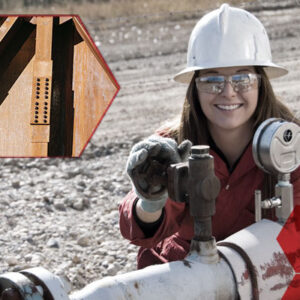Introduction

Corrosion is a natural process that causes billions of dollars in material losses. It occurs when materials deteriorate due to chemical reactions with their environment, such as moisture or acidic substances. Metals, concrete, and even plastics are all susceptible to corrosion. Corrosion can weaken structures, reduce lifespan, and even pose safety hazards. Effective prevention strategies include protective coatings, proper maintenance, and using corrosion-resistant materials. Corrosion engineering is an engineering speciality that applies scientific, technical, and engineering skills and knowledge of natural laws and physical resources to design and implement materials, structures, devices, systems, and procedures to manage corrosion. It involves the application of the principles evolved from corrosion science to minimise or prevent corrosion. AMPP is a leading international association of professionals and experts dedicated to the cause of material protection and corrosion control.
AMPP – Association for Materials Protection and Performance

The AMPP (Association for Materials Protection and Performance) is a professional association formed for the protection of assets and the performance of materials. AMPP was created when NACE International and SSPC (Society for Protective Coatings) merged in 2021. In the words of Bob Chalker, the CEO of AMPP, “AMPP will bring together the world’s leading corrosion prevention and protective coatings organisations under one umbrella. With a vision to create a safer, protected, and sustainable world, the new association will focus on the future of materials protection and performance.”
AMPP consists of two distinct governance structures that provide services to members in the areas of certification, accreditation, membership, advocacy, and public affairs, along with a focus on standards, technical and research activities, conferences, events, education, training, publications, and preprofessional programming.

With the merger of NACE International and SSPC, AMPP can now provide a depth and breadth of materials protection and performance information, standards, education, certification, and contractor accreditation programming that no other organisation can provide. As a result, AMPP has raised the level of excellence of the professional community to have a massive positive impact on society through the protection of materials.
The merging of the two institutes brings together the expertise of professionals who have been instrumental in developing new training standards, training publications, and other technical resources that support the organisation’s members and bring higher levels of advancement to the industry. With AMPP, all individuals associated with coatings and materials protection, such as contractors, owners, craftsmen, manufacturers, corrosion experts, consultants, and industry stakeholders, work together under a single umbrella to develop new technologies and standards to combat corrosion and protect critical infrastructure across the globe.
What is the AMPP certification?

The Association of Materials Protection and Performance provides various technical courses and programs that are carefully designed to provide technical skills and knowledge that enhance the career opportunities of newbies as well as technicians, degreed engineers, scientists, and senior-level management. For example, the AMPP certification program is a renowned global certification program for professionals in the corrosion and coating industry, which is provided by the Association for Materials Protection and Performance (AMPP), previously known as NACE International. This program is specifically designed to help professionals in corrosion prevention, coating inspection, and other related fields demonstrate their knowledge and expertise.
In India, the CORCON INSTITUTE OF CORROSION is the official licensee for NACE International’s education and certification programs. It offers comprehensive certified certifications and training in India. Thanks to its partnership with AMPP (formerly NACE International), CORCON has access to the necessary resources and expertise to provide the most advanced and complete AMPP corrosion training programs in India.
Let us understand some features that make AMPP certifications a top choice for students and professionals globally.
1. Designed by globally recognised experts in the industry:

The AMPP courses are designed by industry experts passionate about protective coatings and work tirelessly to keep the courses up to date with the latest developments. These dedicated professionals are committed to developing the next generation of professionals who will build on current levels of knowledge and continue to make industry advancements. This ensures that the courses push the industry to higher levels of excellence.
2. Decades of Experience:
The instructors and course designers of AMPP courses are super-specialists with decades of experience who undergo a lengthy and rigorous process to become an instructor. Upon receiving the qualification to train, they must clear quality assessments, maintain their associated certifications, and attend ongoing professional development seminars and conferences. These stringent methods ensure that you are trained by the most qualified experts in the industry who possess unique and unparalleled experience and insights into the industry.
3. Worldwide presence:
AMPP has a global presence and offers over 850 courses each year in 30+ countries, making it one of the most recognised and trusted certification courses in the field of corrosion control. Corcon Institute of Corrosion is the official education licensee for AMPP in India.
4. Focus on continued learning:

AMPP courses are active for a specified time frame, and candidates are required to have a prerequisite on-field experience of the specified period to recertify their certificates. In addition, all certificate holders, including trainers, are required to maintain their associated certifications and adhere to the ongoing professional development specifications. This ensures the highest level of professionalism, expertise, and continuous learning in the field of corrosion control.
5. Code of Conduct:
All members of AMPP are required to adhere to a strict code of conduct that lays down the highest standards of honesty and integrity that are based on the core values of the institute.
These inherent features of AMPP make it one of the top institutes in the corrosion control industry, having worldwide recognition and acceptance across sectors and industries.
Furthermore, AMPP has been accredited as an Authorized Provider by the International Association for Continuing Education and Training (IACET). This further demonstrates its compliance with the internationally recognised standard of good practice, ANSI/IACET. Therefore, AMPP is also authorised to offer IACET CEUs for programs that qualify under the said standard.
What is AMPP CIP?

The AMPP (CIP) Coatings Inspector Program brings together two well-established and highly respected certification programs, namely the NACE CIP (Coating Inspector Program) and the SSPC PCI (Protective Coatings Inspector Program). The goal of this program is to provide a comprehensive and industry-leading certification for professionals who are responsible for inspecting and ensuring the quality of coatings and corrosion protection systems in a variety of industries.
By combining the expertise and resources of both NACE and SSPC, AMPP aims to create a unified, globally recognised certification program that will set the standard for coatings inspectors. This program aims to provide a clear and consistent framework for evaluating the knowledge and skills of coatings inspectors, ensuring that they meet the highest levels of industry standards and can effectively perform their job duties.
What are the qualifications needed for an AMPP CIP Level 1 candidate?

No qualifications are required for an AMPP Coating Inspector Program (CIP) – Level 1 candidate. The CIP Level 1 program is the beginner program of coatings inspection offered by AMPP. It is open to anyone interested in gaining knowledge of protective coatings for corrosion control and the protection of materials from environmental damage. The course provides a basic knowledge of the kinds of coatings materials used, the different techniques of preparing the surface for corrosion control coating, the techniques of coating application, and the methods of inspection technique and documentation.
This course is the first step to obtaining the Basic Coating Inspector certification. After completion of CIP Level 1 Certification, an individual needs to successfully complete the Ethics for the Corrosion Professional course and appear and clear the Basic Coating Inspector Practical exam administered in the classroom. After this, the candidate must agree to the AMPP terms of service, Candidate Agreement, and Code of Professional Conduct.
It is important to note that although there are no prerequisites for the AMPP CIP Level 1 course, a candidate needs to have the required work experience and should have cleared the AMPP CIP Level 1 course to apply for the Basic Coatings Inspector Certification.
The AMPP CIP Level 1 Course is a 6-day course comprising lectures, group exercises, case studies, and hands-on practical labs. Apart from theory, students are required to participate in real-life inspection projects, which are formulated to apply the learned concepts on-site. In addition, there is a focus on inspection procedures, proper instrument usage, and the development of problem-solving skills.
What will I learn in the AMPP CIP Level 1 Course?

At the completion of this course, candidates will have gained a comprehensive understanding of corrosion fundamentals. They will be able to provide examples of the properties of a coating, coating classification, and modes of protection. Additionally, they will be able to identify different coating types and curing mechanisms. Candidates will also be able to recall coating specifications, including service environments and coating life cycles.
Furthermore, they will have a thorough understanding of surface preparation equipment, methods, and standards for abrasive blasting, solvent cleaning, and power and manual tool cleaning. They will be able to differentiate coating applications by type, including brush, roller, mitt, and conventional and airless spray. Additionally, candidates will be able to demonstrate inspection procedures and describe the role of the inspector as it applies to safety, ethics, conflict prevention, and decision-making.

Candidates will also learn how to test for environmental or ambient conditions and non-visible contaminants. They will have the capability to utilise non-destructive test instruments such as wet-film and dry-film thickness gauges and low and high-voltage holiday detectors. Additionally, they will be able to measure surface profiles using replica tape and anvil micrometres, surface profile comparators, and digital surface profile gauges.
Candidates will be able to identify quality control issues and recognise design and fabrication defects and coating failure modes. They will also know how to utilise Safety Data Sheets (SDS) and product technical data sheets. Lastly, candidates will be able to demonstrate the purpose and content of the logbook and report documentation, ensuring they have the necessary skills to apply their knowledge in a practical setting.
How can I get the study material for the AMPP CIP Level 1 exam?

CORCON – The Institute of Corrosion Control in India offers the CIP Level 1 course in India. To access the study material for the course, you need to enrol yourself for the course at the official website. Once you are enrolled, you will gain access to all the required study and course material to complete the course.
You will also need to attend the six-day classroom instruction conducted by the institute across various centres and complete it. The classroom instruction includes group exercises, case studies, and hands-on practical labs, along with lectures for a comprehensive study experience. You will also need to participate in real-life inspection projects that have been formulated to apply the learned concepts to the job site for practical experience. Apart from the course materials, you will also find exam preparation guides for the practical exam as well as the written exam on the institute’s website. Candidates have to clear each learning assessment and the practical exam, which is conducted on the last day of the class. For more details on the course, exams and access to study materials, you can refer to the AMPP website.
Conclusion
A certification from a reputed institute like AMPP is a valuable asset for professionals looking to establish themselves in the field of corrosion control and materials protection. The CIP certification, in particular, provides individuals with the knowledge, skills, and recognition necessary to become a part of the global community of certified coatings inspectors. Individuals who complete a certification program from AMPP demonstrate their high level of expertise and dedication to their craft. With AMPP’s global recognition and cross-industry acceptance, those with an AMPP certification can stand out from the competition and gain a foothold in this dynamic and growing industry.
Image Reference: Freepik
Disclaimer: All trademarks, logos, and brand names are the property of their respective owners. All company, product, and service names used in this website are for identification purposes only. Use of these names, trademarks, and brands does not imply endorsement.

